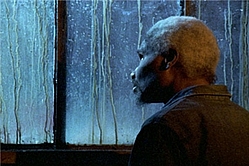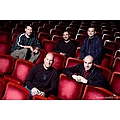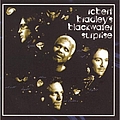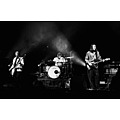Robert Bradley's Blackwater Surprise Biography
Simply put, Robert Bradley’s life is the stuff of rock and roll legend. Born the blind son of an Alabama farmer, and one of 14 children, Bradley had spent a lifetime singing in churches and on the streets of Detroit before his childhood dreams of life as a soul singer finally came true. Now 56, Bradley was in his 40s when he signed his first record deal, debuting on the RCA label with his band of white Detroit rock musicians, the Blackwater Surprise. Immediately striking a chord with fans of sweaty, heartfelt soul music, Bradley’s deep, raspy voice was—and is—very much a pure representation of who he is: It bears both the sweetness of his country roots and the grit of the Detroit sidewalks where he made his living for more than a decade. It beautifully blends his loves for everyone from Chuck Willis and Otis Redding to the Rolling Stones and Fats Domino. Born in Evergreen, Alabama, the son of a homemaker and a farmer, Bradley bounced back and forth from Alabama, Detroit and California, before he became somewhat of a local celebrity as a busker at Detroit’s Eastern Market in the ‘70s and ‘80s, where he strummed out hours of originals occasionally interrupted by a gospel standard or Temptations cover. As a child, he grew up listening to country and western and the local blues programs favored by his father: But the likes of Louis Jordan, Elmore James and Robert Johnson were forbidden in his grandmother’s home, where he was schooled on gospel. “She had a piano, and when I was a kid, I’d go over there and play it, but that’s all we were allowed to play—gospel. No boogie-woogie.” At home, it was a different story: “When I was seven or eight years old, my little sisters and I used to play this game called Jukebox, where they would put a penny down on the table, and I would sit under it and sing songs by Nat King Cole, Andy Williams, Ricky Nelson, whoever was popular at the time.” Before he was a teenager, and after painful experiences trying to get an education in intolerant public schools, Bradley’s parents enrolled him in The Alabama School for the Blind, the meeting place of future gospel legends The Blinds Boys of Alabama. By the time he was 14, his voice began to morph into the strong, deep baritone that it is now. And not only did it help him fall in with classmates, with whom he would regularly harmonize, but it paid dividends back at home in Evergreen: “My job on the farm was to feed the chickens, and the cows and the pigs, and when my voice got stronger, I could call ‘em easier.” Encouraged by the faculty and classmates, he began singing more and more often, getting hooked on records by Fats Domino, Hank Ballard and especially “C.C. Rider” by Chuck Willis: “That was the first song that really got me.” With his classmates, he’d attend Sunday gospel concerts, featuring local acts and sometimes such top names like the Soul Stirrers. “They’d always let the blind kids get up and sing, and people would love it, and give us a quarter. That was my indoctrination.” When he was 16, and in the height of the Motown era, Bradley’s father took a job in Detroit as a mechanic, and the family settled off of 8 Mile Road, where much of his family remains. In the mid-‘60s, blind kids were given free admission to the big Motown revues downtown, and Bradley as a teen stood in the back and listened to the label’s finest: Marvin Gaye, The Supremes, Stevie Wonder, The Four Tops. Tired of the frigid north and inspired to get his own record deal, he and an also relocated Alabama cousin took off for Los Angeles, not long after getting to Detroit. Landing in Watts in the late 1960s, Robert scored jobs playing and singing in churches in South Central L.A. and further south in Santa Ana in Orange County, but never catching the ear of a West Coast record exec. After returning to Detroit for his father’s funeral, Bradley began playing in a local church. Another cousin founded his own record label, Jackpot Records, and Robert recorded his first song: “Gimme Me One More Chance to Say I’m Sorry.” Recorded in 1973 or ‘74, it was the first time he blended rock with R&B. But both the label and song, only a few copies which were ever made, disappeared quickly. After that, he cut various demos, some even at the former Motown studio, where he recorded with the likes of Don Davis, and even some of the fabled Funk Brothers, the Motown backing band. In the late ’70s, he started playing on the street, making enough to support both his immediate family, and other family members, and he began singing the songs that would compose his first album: “California,” “Once Upon a Time,” “Time to Discover.” “The first time I went down there, I went there for an hour and made 40 dollars,” Bradley says of his first busking experience at Eastern Market. “I was like, man, I should be here all day, but I was scared too push it. So I went back the next time for four hours and nobody said nothing. The next time, I went back for six hours.” For 10 years, not only did no one bother him, but Robert became a favorite of shoppers. “I would try songs out on the street. If people didn’t like it out there, I would say, ‘Well, forget that.’ On the street you gotta be kicking ass, you have to catch people. Only so many people are gonna give out of pity or sorrow, most people are gonna give out of the fact that you touched ‘em.” And he was doing that every time he set up with his guitar and tip jar, striking nostalgic chords with songs like “Once Upon a Time,” his great ode to his heroes—Sam Cooke, Marvin Gaye, Otis Redding—written as a reaction to Gaye’s death and romancing the ladies with songs like “For the Night.” But after more than a decade, street entertainers had somewhat overrun the market, and city officials soon closed it to buskers. After setting up shop on a nearby street, he caught the ear of local drummer Jeff Fowlkes, who was late arriving to a rehearsal with bandmates and brothers Michael and Andrew Nehra. Fowlkes was so struck that he convinced the Nehras to have a listen. In just months, the band’s powerful mix of soul, rock, and blues was born. “The Lord moves in mysterious ways.” That was in 1992, and over the next few years, Bradley, Fowlkes and the Nehras built the tracks that became Robert Bradley’s Blackwater Surprise, a mix of classic soul, blues and R&B, Stax- and Stones-inspired rock music that even dipped into psychedelia. The album spawned hits with “California” and “Once Upon a Time” which scored regular rotation on MTV, its classy video featuring Robert singing the hell out of the vocal, eyes closed. Scoring tours with the likes of the Dave Matthews Band and the Allman Brothers Band and on the mammoth H.O.R.D.E. festival, the band returned in 2000 with Time to Discover, featuring guest vocals from old friend and fellow Detroiter Kid Rock on two tracks, one (“Higher”) used in a popular Gatorade commercial. Again unearthing some decades-old tunes Robert had stored in the back of his head but never recorded, Time to Discover was another mix of rockers and ballads, spiced with a little hip-hop and funk. In 2002, Bradley returned with New Ground, a varied set featuring everything from “Willie Lee,” a fun, acoustic ode to his pot-puffing brother, to the beautiful, patriotic anthem “Born in America,” which has become the theme song of the Henry Ford Museum. The next year brought the humble Still Lovin’ You, a quiet, piano-based record that featured some of Bradley’s finest ballad work yet. Also in 2003, Robert was prominently featured in the documentary Playing for Change, an arty film celebrating street singers and the great U.S. street-singer hubs: New Orleans, New York, Venice Beach. The next year he made his acting debut in a major film, starring as bluesman Otis McClanahan in HBO’s award-winning Lackawanna Blues. For the film’s soundtrack, he covered Elmore James’ “Something Inside Me” and Floyd Jones’ “Dark Road” and dueted with Macy Gray on “Down on Me.” With the 2006 release of the two-CD live album What About That: New Year’s In Bloomington, he spans his catalog with two electric sets caught before and after midnight on New Year’s Eve 2005 at one of his favorite tour stops, the Bluebird in Bloomington, Indiana. In the four very special soundcheck recordings that end the album, he also dips into his gospel roots, delivering the new spiritual “What About the Man (Who Died on the Cross)” and an a capella version of the traditional “Will the Circle Be Unbroken,” a song he used to sing with classmates at The Alabama School for the Blind. “I’ve always been into ballads, love songs,” he says. “I’ve never been into shake-your-booty kind of things. I was into more religious, spiritual-type stuff. Those kind of songs, and music in general just soothes the savage beast in me. It soothes it. It takes it out. It takes out that ‘Why me?’ part, that ‘Why did I have to be blind,’ part of me. When I sing, I just get so happy that I believe I can see, that I can fly.” -- Wes Orshoski, NYC (March 2006) Five years after the last studio record, Robert Bradley's Blackwater Surprise is releasing "Out of the Wilderness" for 2008. Across an intriguing selection of new material, Robert performs with a passionate sincerity whether the subject is his daughter leaving home for the first time in the unusually up-tempo "Beautiful Girl," his yearning for true love in "Gotta Find a Woman," longing for his home in the ballad to his state "Alabama," or just a brother living in "Americaland." The ten song emotional journey exposes Robert doing what he does best - captivating with his unmistakable soulfully expressive voice that is deepened by a sense of his hard-won personal life experience. "This record brings me back to the time when I started out wanting to be a singer-songwriter, where the music did not need the New York Philharmonic to make it real. It's just me at the piano with the musicians around me finding my groove. I wanted to do a record and just be Robert and sing straight like Jim Reeves on 'Put Your Sweet Lips a Little Closer to the Phone.' I wanted to do a record that was innocent. That's why I say Out of the Wilderness because it is like I've just been born," explains Bradley.
Top Robert Bradley's Blackwater Surprise Lyrics
| Title | |
|---|---|
| 1 | Time To Discover lyrics |
| 2 | Ultimate Sacrifice lyrics |
| 3 | Baby lyrics |
| 4 | Comin' Down lyrics |
| 5 | Gambler lyrics |
| 6 | Mr. Tony lyrics |
| 7 | Ride lyrics |
| 8 | Take Love And Recieve It lyrics |
| 9 | Tramp lyrics |
| 10 | Uncle John lyrics |
Write a comment
What do you think about Robert Bradley's Blackwater Surprise? Let us know in the comments below!
Robert Bradley's Blackwater Surprise Albums
| Title | Release | ||
|---|---|---|---|
| 1 | Time To Discover | 2000 | |
| 2 | Robert Bradley's Blackwater Surprise | 1995 |
Similar artists
- Robert BradleyBlues
- Big Head Todd And The MonstersBlues/Rock
- The SamplesPunk/Rock
- Jay FarrarCountry/Folk
- Robert Earl KeenCountry
- Uncle TupeloCountry/Indie
- John HiattBlues/Rock

















